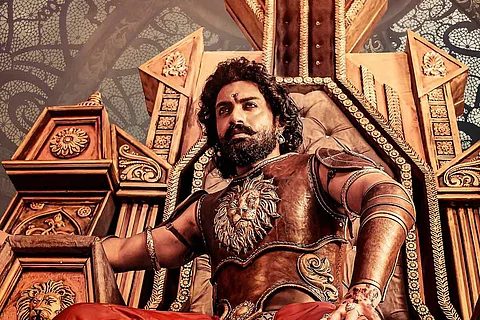

Mallidi Vashishta’s debut film Bimbisara is about a king from 500 BC who arrives in our current world against his wishes. Full of ego and manic energy, he doesn’t spare anyone who stands in his way, be it a sparrow or a child. But unceremoniously removed from his position as the emperor of Trigarthala, he begins to discover humanity and the meaning of dharma.
Now this sounds like a very profound idea but Bimbisara, at its heart, is a masala film. For the first 20 minutes or so, it plays out like a terrible stage play. The visual effects are tacky; the sets look like they were borrowed from a school annual day. I was worried that a strong breeze would be enough for the whole palace to collapse on the actors. There’s also an item number with Warina Hussain – apparently, women dancers were gyrating in 500 BC in the exact same way as they do in our cinema now. There’s a historical fact I did not know.
Also, Bimbisara (Kalyan Ram) has a bunch of ‘Cherokee’ tribal warriors guarding a secret cave of treasures. The descendents of these ‘Cherokee’ tribal people continue to guard the cave in our time too. I didn’t understand how any of this happened considering the Cherokee are indigeneous people who live in the Americas. The Cherokee people in the film also looked Indian, adding to my puzzlement. This cave has blood analysis and handprint and voice recognition as security measures. It’s almost like Tom Cruise time travelled to 500 BC and built it for Bimbisara.
But there’s something to be said about Kalyan Ram’s conviction as an actor. When he walks over a crocodile that looks like it’s from Chhota Bheem, he does so with a certain regal air that makes you buy into Bimbisara’s character. Srinivasa Reddy as his lackey is quite hilarious with his caricaturish moustache. The film becomes a lot better when it escapes the no-budget Baahubali sets and lands in present day Hyderabad. Kalyan Ram brings his comic timing to the fore, and there are some moments in the film that are laugh-out-loud funny. The conduit between the past and the present is a mirror and director Vashishta uses this well to generate humour.
Vivan Bhatena plays Subramanya Shastry, a modern day doctor who desperately wants something from Bimbisara’s cave of treasures – a book on Ayurveda called Dhanwantari. Assisting Subramanya in this mission is a scary-looking man in saffron robes called Ketu (Ayyappa P Sharma). Vashishta airdrops Ketu on us; we don’t know where he came from or how he knows so much about Bimbisara.
The careless writing extends to the other characters too. Samyuktha Menon plays a senior police officer but she’s never in uniform; are those short dresses meant to be ‘mufti’, and if so, why is she in disguise to begin with? More remarkably, when Bimbisara kills people around him like an expert pest control operator with an electric mosquito bat, she does nothing at all. Catherine Tresa gets a blink-and-miss role as a princess. Warina probably got more screen time than her with the item number.
Bimbisara is enjoyable when it doesn’t take itself too seriously, and the hero bumbles around his new world. When it tries to pull off something beyond that though, it falters. There are simply too many holes in the plot that cannot be compensated for by MM Keeravani’s bombastic music. Sample this: Prakash Raj is a super rich royal family descendent. Yet, when his family is threatened, he is completely helpless and just stands around fatalistically. We’re also told that the ancient Dhanwantari has an ‘antidote’ for a new age virus called ‘D-40’ that can instantly cure a patient. It can be argued that it is part of the fantasy but it seemed more like an earnest inspiration drawn from pseudo science.
Bimbisara is entertaining in parts, and is anchored mainly by Kalyan Ram’s performance. It would have worked better if Vashishta hadn’t tried to tick every box in the masala film genre and trusted the material more.
Disclaimer: This review was not paid for or commissioned by anyone associated with the series/film. TNM Editorial is independent of any business relationship the organisation may have with producers or any other members of its cast or crew.
Sowmya Rajendran writes on gender, culture and cinema. She has written over 25 books, including a nonfiction book on gender for adolescents. She was awarded the Sahitya Akademi’s Bal Sahitya Puraskar for her novel Mayil Will Not Be Quiet in 2015.